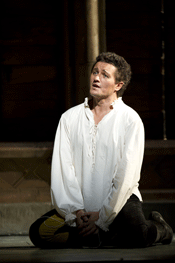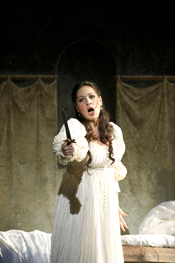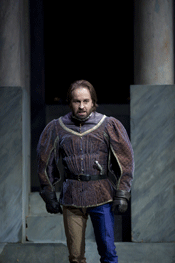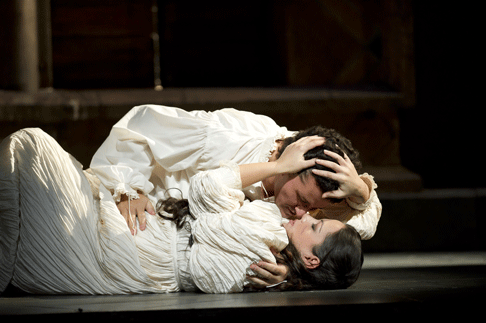Hence the reputation of this opera has rested on its showpiece arias, and on
good performances. Piotr Beczala defined this production at the Royal Opera
House, London with an excellent Roméo, well shaped vocally and expressively
full of character.
 Piotr Beczala as Roméo
Piotr Beczala as Roméo
Beczala is relatively new to Roméo, having created it at Salzburg in 2008,
and again in August 2010. Nino Machaidze sang Juliette at Salzburg this year
too, at later stages of the run, which started with Anna Netrebko and Beczala.
Pairing Beczala and Machaidze for the London production was an inspired choice.
Although the productions in Salzburg and London are completely different,
Beczala and Machaidze carried over what they’d built previously.
The London production is Stephen Barlow’s revival of Nicholas
Joel’s production, revived only for the second time since 1994.The sets
are like picture postcards, and the pace of movement staid, almost unnatural.
It’s worrying when the most vivid scenes are choreographed by the Fight
Director, Philip Stafford. Admittedly, Gounod’s treatment of Roméo et
Juliette doesn’t lend itself to intellectual depth, but fortunately
Beczala amd Machaidze injected enthusiasm into the production.
 Nino Machaidze as Juliette
Nino Machaidze as Juliette
Beczala’s Roméo defined the performance. Excellent pitch control,
luscious timbre. A wonderful and deeply expressive “L’ amour, oui,
son ardeur a troublé tout mon être!”. The love duets were beautiful, even
if Beczala overshadowed Machaidze’s Juliette. Still, that’s not
surprising, as he’s just more experienced. With Netrebko he must have
been superb. In the last act, Beczala’s “Salut, tombeau sombre et
silencieux!,” was well modulated, emotionally profound. marred very
slightly when he had to turn backwards, projecting sound awry. I loved
Beczala’s Shepherd in Szymanowski’s Król Roger and enjoyed
hearing him develop over the years. Romantic Heroes are now his forte, but he
has the depth, I think, to eventually tackle Heldentenor territory.
 Alfie Boe as Tybalt
Alfie Boe as Tybalt
Machaidze looks like Olivia Hussey in Franco Zeffirelli’s 1968 film of Romeo and Juliet, which adds piquancy to her portrayal. Her voice is light and agile, the brightness of her timbre expressing Juliette’s youthful innocence, her firm lower register expressing the wilder parts of Juliette’s character. Like many 14 year olds, Juliette does extremes, as Shakespeare observed. Machaidze may not have the polish of many much more famous and experienced singers but she’s convincing
enough. When she sings of waking too soon, holding Tybalt’s bloodstained hand, she sings with such fervour that you realize that this Juliette knows what risks she’s taking. Sweet as she is, Machaidze’s Juliette has a brain.
Good performance standards all round. Darren Jeffrey as Capulet towers
physically over the other players, which is as well, for Gounod develops the
part well. Vitalij Kowaljow’s Frère Laurent was also notable and Stéphane
Degout as Mercutio.
Ketevan Kemoklidze’s Stéphano, Roméo’s Page, makes a delightful
impression in the song about doves and vultures, but artistically the vignette
adds little.
Alfie Boe as Tybalt received prolonged applause which he acknowledged as if
he were a principal. He has a huge following because he does popular song but
that adulation might be his undoing. Not long ago a fan complained when he was
unwell and couldn’t adequately be replaced. That kind of audience
isn’t into opera as such, but in chasing celebrity.
 Piotr Beczala as Roméo and Nino Machaidze as Juliette
Piotr Beczala as Roméo and Nino Machaidze as Juliette
Gounod’s choruses are justly celebrated and the Royal Opera House
chorus responded well. Here they were directed to maximum advantage, and as
usual, their performance was well executed.
For more information, please see the Royal Opera House
website.
Anne Ozorio




